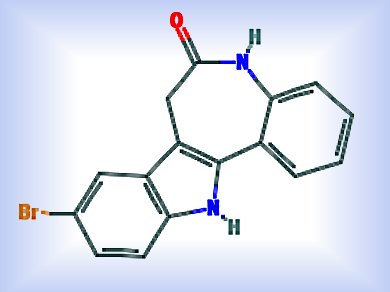Amyotrophic lateral sclerosis (ALS) is a severe neurodegenerative disease caused by the death of motor neurons, nervous cells which control muscles’ activity. Due to the lack of effective therapies, this pathological condition is fatal. A promising compound for ALS treatment, however, has emerged from a study conducted by Yin Yang, Harvard University, Boston, USA, and colleagues.
While motor neurons derived from ALS, patients died when exposed to toxic stimuli. Treatment with kenpaullone (9-bromo-7,12-dihydro-indolo[3,2-d][1]benzazepin-6(5H)-one, pictured) effectively prolonged the survival of the motor neuron cells and preserved their proper electrical activity. These results were mostly due to kenpaullone’s ability to inhibit MAP4K4 (mitogen-activated protein kinase kinase kinase kinase 4), an enzyme that promotes cellular death.
Kenpaullone may thus represent a future therapeutic option for ALS patients.
- A Small Molecule Screen in Stem-Cell-Derived Motor Neurons Identifies a Kinase Inhibitor as a Candidate Therapeutic for ALS,
Yin M. Yang, Shailesh K. Gupta, Kevin J. Kim, Berit E. Powers, Antonio Cerqueira, Brian J. Wainger, Hien D. Ngo, Kathryn A. Rosowski, Pamela A. Schein, Courtney A. Ackeifi, Anthony C. Arvanites, Lance S. Davidow, Clifford J. Woolf, Lee L. Rubin,
Cell Stem Cell 2013, 12 (6), 713–726.
DOI: 10.1016/j.stem.2013.04.003





In addition to the potential for ALS, might it also help stop the brain cell death related to Progressive Supranuclear Palsy?